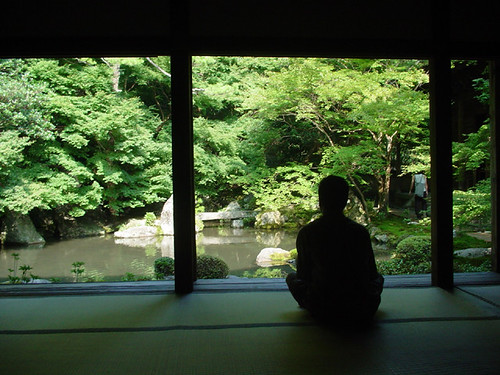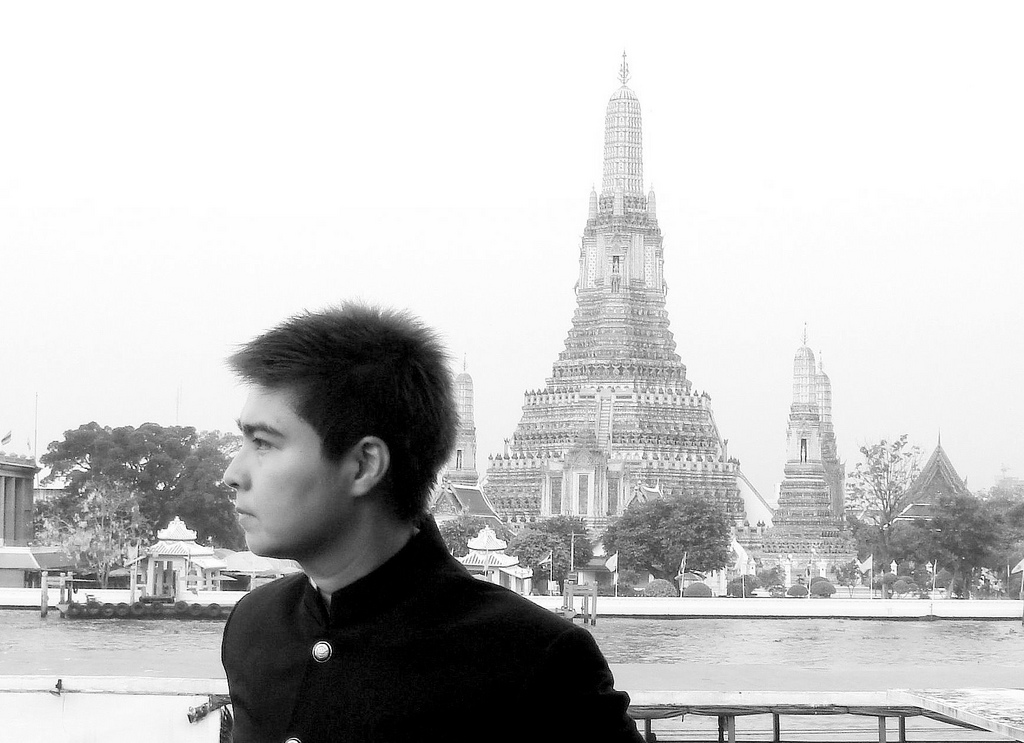
Summer Garden by Pam from Tokyo
For eight days and seven nights last week, the author had the blissful opportunity to attend a mindfulness meditation retreat in the northern part of Thailand. May the readers have all the boon, merit, that the author did. May you all be happy, peaceful, and free from suffering.
Happiness, peace and freedom from suffering was indeed what was on our minds the minute we city dwellers stepped out of the calm, cool and serene retreat and back into the hustle and bustles of this world. Turning on our mobile phone for the first time in a week, we were greeted with news that made our hearts sink.
It is true that mindfulness training is supposed to give us extra immunity to live in this increasingly hostile world. But, being unenlightened as we are, our spontaneous reaction was to turn back to the forest to continue our simple, blissful living among the embrace of nature.
When Lord Buddha Chose Solitude
This reminds the author of the time when Lord Buddha himself became weary of undisciplined monks while he was in residence at Kositaram temple in the city of Kosambi. The time was the 10th vassa (year) since Lord Buddha started his teaching.
Wanting to give the monk a lesson, Lord Buddha simply went into the forest to spend the three-month Buddhist Lent in solitude. This event of Lord Buddha's life is usually depicted by a painting or sculpture of him sitting with an elephant and a monkey at his feet. It was said that those animals were taking care of him throughout the Lent, with the elephant bringing a bamboo pipe filled with water and the monkey bringing honeycomb.
The story has it that, when Lord Buddha saw the kind consideration that the animals had shown to him, he decided to stay there in the forest with them, graciously accepting their alms. Indeed, who would not want to be among friendly creatures?
Alternatively speaking, even Lord Buddha himself did not want to keep company with the unruly kind. On that day that we stepped out of our retreat and heard our national news, we thought we understood what Lord Buddha must have felt. The big difference, of course, is that we were not yet Enlightened and even if we chose to stay in the forest, it is unlikely that it would bring any awareness to the unruly people.
Lord Buddha's preference for solitude over undisciplined company is perhaps best summarised in the following Dhammapada the Path to Dhamma or versified Buddhist scripture:
"If, as he fares, he finds no companion
Who is better or equal,
Let him firmly pursue his solitary career;
There is no fellowship with the fool"
(Source: http://larndham.net/dmbot/)
This teaching also goes hand in hand with another teaching in the 38 Mangala or the 38 Blissful Things, the first two of which are 1) not to associate with fools, 2) to associate with the wise.
Therefore, if any of our dear readers in Thailand feel weary at this point, may be it helps to keep these teachings in mind. Come to think of it, who would you rather be with? Someone who can remain calm amidst chaos, who are mindful and can provide you with sensible advice, or someone who wears you down with flames after flames or their hatred, blind greed, and/or anger?
An 8th-Century Buddhist Poet on Hatred and Enemies
In the 8th century, there was an Indian Buddhist scholar with the name of Shantideva. He was credited with penning Bodhicaryavatara, or "A Guide to the Bodhisattva's Way of Life."
Basically, it is a long poem describing the process of Enlightenment from the first thought to full Buddhahood. As a result, sometimes it is referred to as "Entering the Path of Enlightenment." The book is still studied by Mahayana and Vajrayana Buddhists today.
Unfortunately, an average Theravada Buddhist in Thailand may not have heard of Shantideva's beautiful, wise prose before. Shantideva covered many topics that a classical period poet usually did. In light of the current situation in Thailand, the author finds it most suitable to both introduce Shantideva's insightful verses on anger and destruction of one's enemies.
"With the vast number of enemies, as boundless as the sky,
what chance is there that all should be subdued?
Yet when the thought of hatred is abolished,
all enemies are destroyed"
(Source: http://www.rinpoche.com )
Admittedly, the abolishment of the thought of hatred is not an easy task. But Shantideva also provided us with a starting point. When someone hurts you, instead of hitting back, how about doing the following:
"All those who slight me to my face,
Or do me any other evil,
Even if they blame or slander me,
May they attain the fortune of enlightenment!"
(Source: http://www.gaia.com)
Personally, the author finds it very classy. Indeed, there is nothing else that people who are burned by their own flames of hatred and anger need more than the fortune of getting Enlightened!
But how could we translate this wise advice into action without further hurting the hateful, angry people? Shantideva also had an answer:
"Whoever wishes to quickly afford protection
to both himself and others
Should practise that most noble secret:
the exchanging of oneself for others"
(Source: http://www.gaia.com)
There you go, the noble secret according to Shantideva is the practice of losing yourself totally so that you can become one with the other party! Only by walking in their shoes, sustaining their suffering, that one's genuine compassion would arise. It is only through compassion and mutual understanding of each other's suffering that confronting parties would realize that we are all but fellow human beings struggling in the same suffering together. With that understanding, we would start to help each other out of suffering.
Although the result of such immediate transformation in the heat of turmoil is guaranteed to be extraordinary, actual practice can be demanding, especially if one is nowhere near the Bodhisattva level yet. If the thought of "we-becoming-them" as the path towards solution still sounds too horrifying for you, there is always a less strenuous approach.
How about spending seven days in a peaceful retreat to cultivate our mindfulness first? After all, it is the starting point of such transformation plus a suffering-immunity vaccine blended into one. Who should go, then? Why, both parties in the conflict, of course! And, quite naturally, we the weary public.







No comments:
Post a Comment